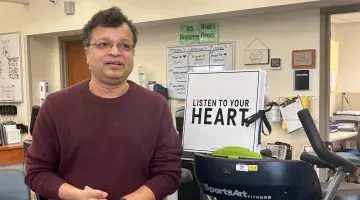'The Cardiac Rehab Team is Incredible – I Can’t Thank Them Enough’
Author

South Shore Health
Vijay Saraf was at work in Boston last August when the symptoms started.
“My arms started to hurt,” said the Weymouth electrician, who decided to take a coffee break with a coworker to shake it off.
“We walked about three blocks and I was winded,” Vijay recalled. “And I couldn’t lift my arms above my head.”
Joking that he “hoped it wasn’t a heart attack,” Vijay who is 44, active and in good health, said he just assumed he must have banged his elbow on the job and that was causing the pain.
After finishing work, Vijay went home and spent Sunday resting because he was feeling very tired.
By Monday morning, he said the pain and stiffness in his arms had resumed along with some numbness. While he rarely takes any over-the-counter pain relievers, Vijay took an Aleve and decided he would stop at an urgent care on the way home from work. After telling the doctor how his arm was feeling, he was given an EKG, which he was told was normal.
But based on the symptoms Vijay described, the urgent care physician suspected he may have had a cardiac event over the weekend and recommended he go to the nearest Emergency Department to have a cardiac enzyme test.
That recommendation likely saved Vijay’s life.
By the time he arrived at the Emergency Department at South Shore Hospital Monday evening, Vijay said his fingertips were getting numb and the pain was now creeping up his left arm.
“My chest was hurting and it felt like someone was pressing their hands on my back and chest at the same time.”
With the symptoms he was having, Vijay was seen right away. After another EKG, blood work and a chest X-ray, Vijay said the pain in his chest and arms had ramped up he was again unable to raise his arms above his head.
“I was sweating profusely, my shoulders were stiff and I was in so much pain, I couldn’t even sit still for the second EKG,” he said.
The second test showed Vijay was having a heart attack and he was wheeled directly to the cardiac catheterization lab where David Denmark, MD and the cardiac team awaited.
Vijay’s catheterization revealed a 100% blockage of the left anterior descending (LAD) artery. Sometimes referred to as “the widowmaker” due to the greater risk of full blockage, the LAD carries nearly 50% of the blood to the heart muscle.
Denmark told Vijay he needed to have four stents inserted to open the artery and restore the blood flow. Immediately following the 55-minute procedure, Vijay said his chest “felt so much better.”
And he realized how fortunate he was to have survived what is very often a fatal heart attack.
While many LAD artery blockages are caused by a buildup of plaque or cholesterol related to smoking or diet, Vijay’s was due to a tear in the lining of the artery known as SCAD – spontaneous coronary artery dissection, which he was told is very rare.
“I eat healthy, never smoked or used drugs,” said Vijay, who has an active lifestyle that includes hiking, skiing and other outdoor activities.
Getting back to that active life after recovery was a priority for Vijay, which is why he chose to participate in South Shore Health's Cardiac Rehabilitation program.
“I wanted to take advantage of everything available so I could get back to where I was or better,” he said.
Like many people who have experienced a cardiac event, Vijay was concerned about how much he could do and how far he could push himself during his recovery.
That’s where the program’s team of nurses and exercise physiologists comes in.
All cardiac rehab patients participate in structured exercise sessions, tailored to their individual needs and updated at frequent intervals throughout the 12-week program. Heart rate, rhythm and blood pressure are monitored before, during and after exercise.
Vijay said being monitored while exercising made cardiac rehab a safe place to heal and regain his strength following his heart attack.
“At the beginning, I didn’t have any confidence,” Vijay said. Being able to say ‘this feels weird’ or ask ‘is this OK’ helped reassure him, he said.
“They push you as much as you want to be pushed within safe parameters,” he said.
After just a few weeks in the program, Vijay said he could see how much he had gained in stamina and confidence.
But the gains weren’t only physical. Vijay also learned the important role a healthy diet and reducing stress plays in your cardiovascular and overall health.
While he was diet conscious before his heart attack and didn’t eat much red meat, Vijay said the program gave him guidelines for a healthy diet and showed which foods to avoid due to high sodium content – including deli turkey and other processed meats.
“I found out that pizza, which I used to eat often, is one of the worst foods,” he said. “Now, I eat salads twice a day, I don’t eat anything fried and I don’t miss it.”
Through his rehab exercise program and dietary changes, Vijay said he’s lost 25-30 pounds and is feeling great physically. “I’d say I’m 110% or more at this point.”
Vijay credits the cardiac rehab team, which he said has become like family, for helping him make his comeback.
“The cardiac rehab team is incredible,” he said. “I can’t thank them enough.”
Vijay keeps in touch with the team and people he went through the program with by attending the monthly cardiac rehab support group, where he always learns new information and is able share his story and offer support to others.
And he recommends the program to anyone recovering from a cardiac event.
“I can’t find one negative thing to say about my experience,” he said. "I just wish it was longer than 12 weeks.”
Set the Pace Race Supports Cardiac Rehab Program
Vijay has another active weekend planned and will show his support for the cardiac rehab program on Saturday, April 27 by running the 5K course in the 12th annual Set the Pace road race for heart health. The event, which also features a 1-mile walk, will be held at Wompatuck State Park in Hingham. Learn more and register for Set the Pace.
Learn more about Cardiac Rehabilitation and Heart and Vascular Care at South Shore Health.
Author

South Shore Health








